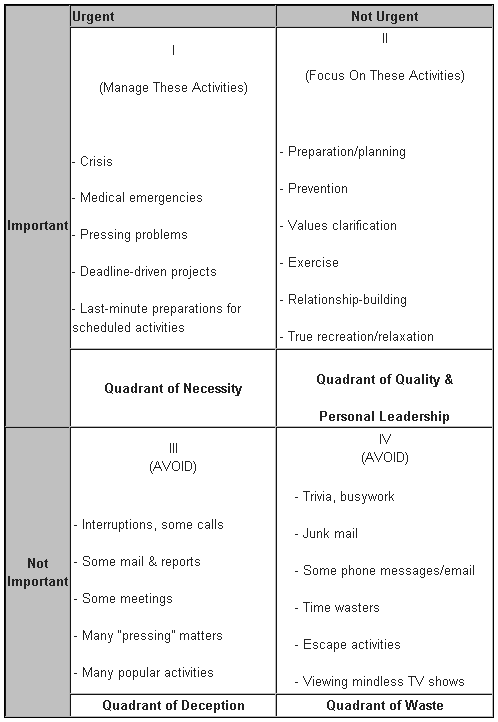The diagram below is the Time Management Matrix - Activities Section (download and print out the PDF version):

What is important to understand is that all of our efforts comprise in part all four of these types of activities, but that you need to ensure that an effective balance is struck between them all.
There are consequences of attending disproportionately to the types is described above.
- If you attend disproportionately to Quadrant I items, the Urgent & Important items, the results will be that you experience stress & burn-out, are able to manage crises, but will always be putting out fires. The hope is that in your everyday life, Quadrant I items are few and far between. Now for ADHDers, we enjoy the rush of dopamine that results from focuses crisis management. But keep doing that, day after day, and you will begin to suffer. Manage this area carefully.
- If you attend disproportionately to Quadrant II items, the Not Urgent & Important items, the results will be that you experience vision, perspective, balance, discipline, control and few crises in your overall life. I cannot overestimate enough - ADHDers need to spend much more time attending to Quadrant II activities - i.e. prevention and capability improvement, relationship building, exploration and recognition of new opportunities in all arenas of your life, planning and indeed recreation opportunities. This is good. Focus on this area carefully.
- If you attend disproportionately to Quadrant III items, the Urgent & Not Important items, the results will be that you experience short term focus, a reputation amongst family, friends and colleagues of having a chameleon character, you will see goals and plans as worthless, likely feel victimized, out of control, and experience shallow or broken relationships. This is bad. Avoid an excessive amount of activities in this area.
- If you attend disproportionately to Quadrant IV items, the Urgent & Important items, the results will be that you experience total irresponsibility, being dismissed from jobs, and end up dependent on others or institutions for basics needs. This is bad. Avoid an excessive amount of activities in this area.
Now, think about how you can use tools & techniques like pattern-planning, calendars, electronic organizers, paper reminders, buddy systems, timers and alarm clocks to get you to attend more to Quadrant II activities.
I guarantee that if you can spend 4 hours a day, 3 times a week, on Quadrant II activities, in a consistent and stable manner, your ADHD symptoms, your home life, your work life, your self-esteem, your general attitudes and mood will improve. Increase that time and you will get better and better results!
Use the third page of the PDF document as a planning document to list out your activities (you'll likely need to replicate this onto a much larger sheet - or sheets of paper) to help you with your analysis.
Hey. Maybe this is the self-coaching focus I need to choose, as I mentioned in an earlier posting about self-coaching. Yes. This sounds excellent!
I'd love to hear your thoughts on this post and if you decide to do any self-coaching based on this concept.
Cheers,
Mungo
Thanks for reading! If you enjoyed this, perhaps you'd like to subscribe to the RSS feed.
You can also follow my tweets at Twitter.com/MungosADHD
Another great job, Mungo. You really cut to the chase, and I appreciate the time it takes to share these all-important, over-arching time-management paradigms with your readers. Kudos!
ReplyDeleteg